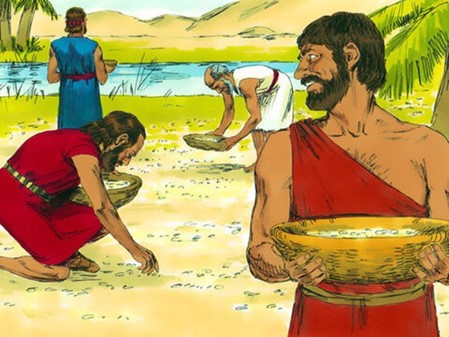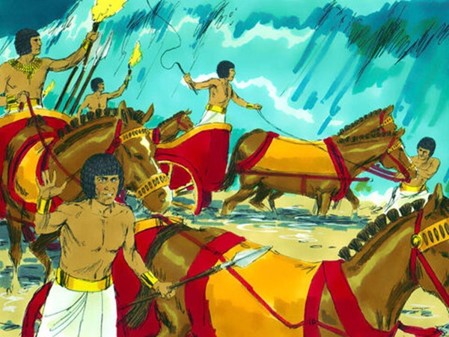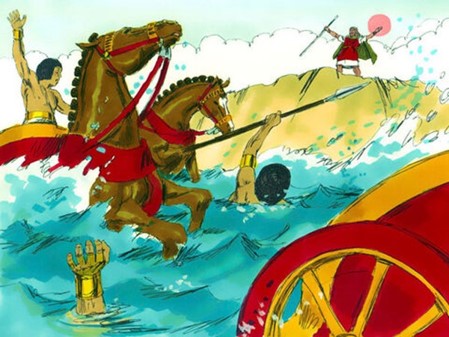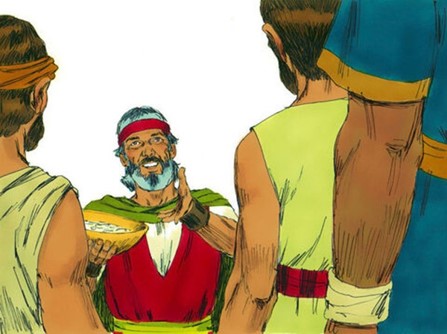Good morning!
Greetings in the name of the Father, the son, and the Holy Spirit.
Whatever is good and perfect is a gift coming down to us from God our Father, who created all the lights in the heavens. He never changes or casts a shifting shadow. (James 1:17)

The Israelites experienced God’s blessings in the middle of the wilderness, where nothing was growing. They did not sow, but they harvested. They were able to eat every day, which was a miracle, and it was daily life.
They went out every morning, and they gathered their food from heaven. They were satisfied every day in the middle of the wilderness. It was impossible to anyone’s eyes, but it happened every day. The wilderness was filled with food each morning, which was a marvelous scene. None could have even imagined it was possible.
It was the fifteenth day of the second month, one month after leaving the land of Egypt. The whole community of Israel set out from Elim and journeyed into the wilderness of Sin, between Elim and Mount Sinai. So far, they ate what they brought with them from Egypt when they left the country.
The first issue for them was water. The water ran out quickly in a matter of days as they were walking through the wilderness. Some Bible translations describe it as a desert. Walking through a desert under the hot sun was not easy for them due to the excitement of getting free from the Egyptians and, more importantly, God’s mighty hand that they witnessed.
As they were moving out of Egypt, Pharaoh, the Egyptian king, who initially released the Israelites in fear of God, who brought ten plagues to the land of Egypt and to his family, changed his mind. He realized that there was even greater fear that his entire country would collapse. His country was operated and supported by the Israelites’ laborers. In other words, they worked like machines for the Egyptians, and the Israelites were the very engine that made the Egyptian economy work. As soon as he saw this, he decided to grab the Israelites and bring them back to Egypt to make them work as before.
Pharaoh took the best army under him with the best chariots, horses, swords, spears, and, most importantly, the bravest soldiers in the whole country, who always brought victory after victory to him as they conquered countries around Egypt. No country ever tried to fight against Pharaoh’s best army because it was futile. Rather than being completely destroyed, one king after another king surrendered. Pharaoh had true confidence in his best army, who were special to him.

How scary it was for the Israelites when they saw Pharaoh’s best army chasing them with the best horses, chariots, swords, and spears! The Israelites were just a bunch of ex-slaves. None of them were trained to fight. The world’s best army vs a bunch of ex-slaves. The outcome was sure. A total annihilation, which was sure to both the Israelites and Pharaoh with his best army.
The Israelites cried out, and Moses prayed to God. God answered. God opened a passage through the Red Sea and let the Israelites walk on dry ground through the Red Sea. Pharaoh’s best army was not deterred. They kept chasing the Israelites. God then put the pillar of fire and cloud between the best Pharaoh’s army and the Israelites. And God threw the best army into total confusion. God even twisted the best army’s chariot wheels, making their chariots difficult to drive.
However, Pharaoh was firm in his decision. He commanded them to keep chasing the Israelites. Thus, the army, who hesitated initially to follow the Israelites into the passage made by God through the Red Sea, started moving into the passage, which made the Israelites even more frightened. They thought they were safe while going through the passage through the Red Sea, but their enemies were now following them into the miraculous path God had created for their escape.
The Israelites’ fear increased with every step the Egyptian army took closer to them. They could see the determination in the eyes of the soldiers and hear the thundering of the chariots and horses behind them. Panic started to spread among the Israelites, and they began to doubt whether they would make it to the other side of the Red Sea in time. They cried out to Moses, begging him to do something to stop the Egyptians from overtaking them.
Moses, filled with faith in God, reassured the Israelites that God would protect them and deliver them from the hands of the Egyptians. He instructed them to keep moving forward, trusting that God would intervene at the right moment. As the Egyptian army continued to close in, the Israelites’ faith was put to the ultimate test.
Just as the Egyptian army seemed poised to overtake the Israelites, God intervened in a miraculous way. He instructed Moses to stretch out his hand over the sea, and as he did so, the waters that had been held back began to collapse back into their original place. The wall of water crashed down upon the Egyptian soldiers, chariots, and horses, swallowing them up in a torrent of divine judgment.
The Israelites, who had just reached the opposite shore, looked back in awe at the scene unfolding before their eyes. They realized that God had not only provided a miraculous escape for them but had also destroyed the most powerful army in the world, which had sought to enslave them once more.

The entire Israelite community, from the small to the big, witnessed this amazing scene and praised God. They gave their full trust to God and Moses, whom God sent to lead them to the Promised Land. They spent the entire day on the other side, singing and dancing in praise of God. They all said, “Surely, none will forget this day and what God has done.”
The Israelites then started moving away from the Red Sea and traveling through the desert. Their joy and excitement began to dwindle. They hoped to pass through the desert quickly, but reality proved different. They walked all day the first day, and the second day was not different. All they saw was a bone-dry desert, and they were still walking through it.
Their water supply was quickly depleting as they journeyed through the desert. On the third day, they ran out of water. The sun was high and hot, and the desert was bone-dry. They felt as if they were dying without water. Some of them had already fainted. Then they complained to God. It only took three days before they complained to God. They had seen and experienced God’s mighty hand, but it became just a distant memory because their current reality was too harsh. They were literally dying without water.
Even so, should they have complained to God? Reading this, without experiencing such pain and a dire need for water, knowing we are dying now in the desert without water, we might easily say they should not have.

If we were in that situation, how many of us would keep faith in God without complaining to God? Remember that we would be dying without water because our water ran out long before, and a bone-dry desert surrounds us under the hot sun that does not know when to stop pounding us with heat, only worsening the situation.
Even so, God provided water as Moses prayed to God. God was gracious and merciful. Not because the Israelites were faithful, but because God was faithful to them, even though they complained directly to God. Yes, God provided. God was truly faithful to the Israelites.
The same God is our Heavenly Father. How comforting! His faithfulness never ends. His mercy is greater than the ocean. His provision is sure because His love is greater than all our sins. Thus, we can come and receive His mercy anytime and always.
Then the Israelites were fully satisfied. They called the place “Marah,” which means bitter. They left Marah and traveled on to the oasis of Elim, where they found twelve springs and seventy palm trees. They camped there beside the water. In summary, God initially tested their faith in Him, but they failed.
Oh no, please don’t think that God tested the Israelites to make them feel miserable. It was not God’s intention. God always wanted the Israelites to grow and mature in Him. But they could not remain as infants before God forever, which would not be good for them either. We all know that we spoil our children by giving them whatever they want and making life too easy for them in all aspects. Why would we think we, as God’s children, are our Ever-Loving Heavenly Father different?
Unfortunately, we tend to see our God as a genie who hears our wishes and grant our wishes. Or, in modern terms, a vending machine that delivers a product when we put in a coin (or a credit card). If so, God would not be our true Ever-Loving Father. We, even earthly parents, don’t do this to our children. Then why wouldn’t our true, never-changing, Ever-Loving Heavenly Father do this to us in His unfathomable love?
We all were once small boys or girls. Experiencing pain was not enjoyable, especially when caused by our parents. Sometimes, it even made us question our parents, wondering, “Do they really love me?” because we knew our parents could give something that we wanted for us, but we saw their behaviors as completely opposite.
Now we, grownups, know why our parents did to us, which was for our own good, not their own benefit. As parents, many of us have made painful decisions not to grant what our children want because it harms them. Then, we painfully watch our children’s reactions, knowing that our decision was made out of true love for them.
Again, sometimes, unfortunately, the consequences linger longer than we wish. They last for many years or even decades. They can be a thorny issue in our children’s hearts. Our attempts to have honest dialogue for mutual understanding and full restoration repetitively fail because our children only remember the pain inflicted by our loving decisions. The same issue between God and us often lingers for many years, even throughout our lives. As parents, we now know what should be done to our children in those situations, and our Heavenly Father did more so for us, His children.
Our Heavenly Father knows what we need, not what we want. And God provides what we need, again, not what we want. Therefore, if we complain to God because we don’t get what we want (from our point of view) but what we need (from our point of view), we should realize how infantile our faith is.
“When I was a child, I spoke and thought and reasoned as a child. But when I grew up, I put away childish things.” (1 Corinthians 13:11)
Please don’t fall into the same pattern as many of our children do. We have to believe that what we receive from God is the best. Why would our Heavenly Father give us something that isn’t the best for us when He knows exactly what we need? Indeed, as earthly parents, we might make mistakes because we are not God, but God has not made any mistakes at all and will not make any mistakes at all, not even one single mistake.

What God wants is our love for Him, just as He loves us. In other words, God wants a genuine relationship bonded by love, which God always provides us. That was the true reason why God tested the Israelites. When they complained, God silently heard and provided. Indeed, God provided.
As they moved to Elim, the next stop, God provided twelve oases, just one oasis in Marah. God was pleased with the Israelites’ joy over the water that God provided in Marah. God wanted to see more joy in His children, the Israelites.
Then, not long after, only one month after departing Egypt, the whole community of Israel complained there too. They did so to Moses, but it was, indeed, to God.
“If only the LORD had killed us back in Egypt,” they moaned. “There we sat around pots filled with meat and ate all the bread we wanted. But now you have brought us into this wilderness to starve us all to death.” (Exodus 16:3)
What can we see? The intensity of their complaint became extreme. Initially, when they didn’t have water to drink, they complained rather gently,
“What are we going to drink?” (Exodus 15:24b)
Yes, they were spoiled, emboldened, and even moaned against God. Then even they praised the slavery life in Egypt. Surely, as parents, we see this pattern repeatedly – while watching our children get worse because we provide, which, in turn, spoiled them.
God was faithful. God, having infinite patience with His children, said to Moses,
“Look, I’m going to rain down food from heaven for you. Each day the people can go out and pick up as much food as they need for that day. I will test them in this to see whether or not they will follow my instructions. On the sixth day they will gather food, and when they prepare it, there will be twice as much as usual.” (Exodus 16:4b-5)
And Moses told them, “It is the food the LORD has given you to eat. These are God’s instructions: Each household should gather as much as it needs. Pick up two quarts for each person in your tent.”

So the people of Israel did as they were told. Some gathered a lot, some only a little. But when they measured it out, everyone had just enough. Those who gathered a lot had nothing left over, and those who gathered only a little had enough. Each family had just what it needed. Whatever the Israelites did, God provided, and none could be ahead of the others, as God provided equally.
Let’s conclude. How was patient our God with the Israelites? Did God provide because the Israelites were faithful? Have the Israelites changed? If so, were they getting better or worse?
How about us? Are we really getting better before God, or are we getting worse like the Israelites? Indeed, we are getting all the good things, indeed the best, from God not because we are faithful to Him but because God is faithful to us.

“As you endure this divine discipline, remember that God is treating you as His own children. Whoever heard of a child who is never disciplined by its father? If God doesn’t discipline you as He does all of His children, it means that you are illegitimate and are not really His children at all.” (Hebrews 12:7-8)
